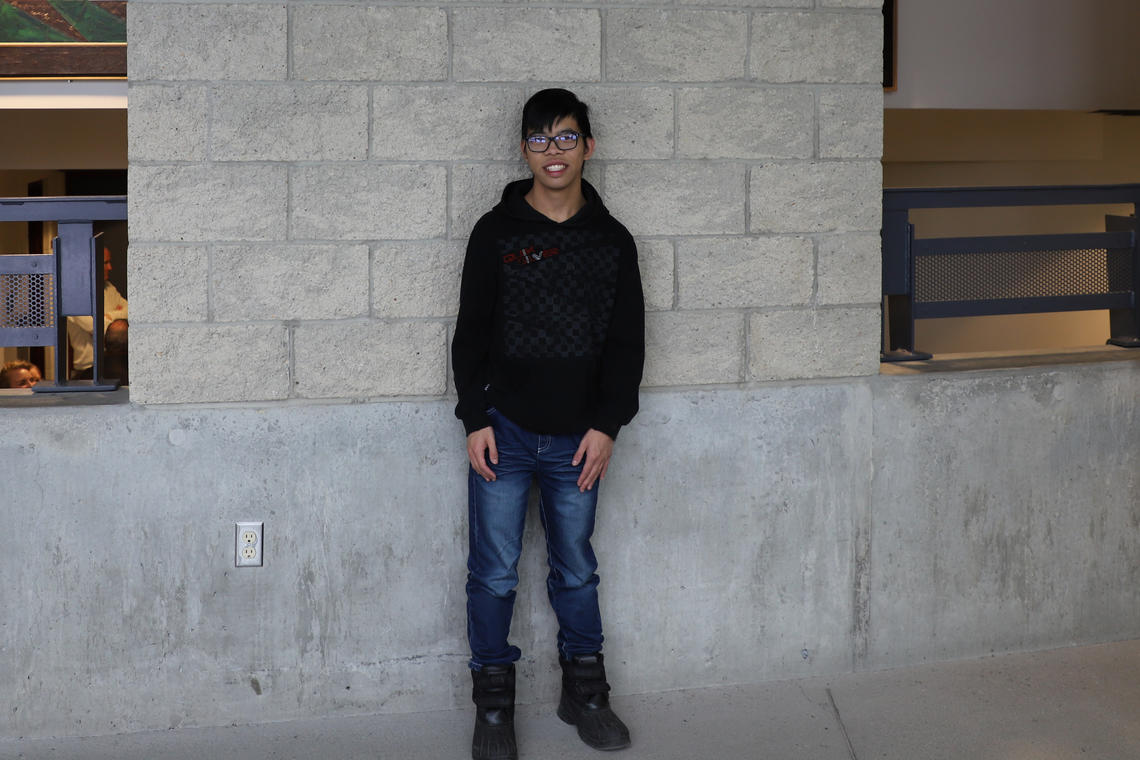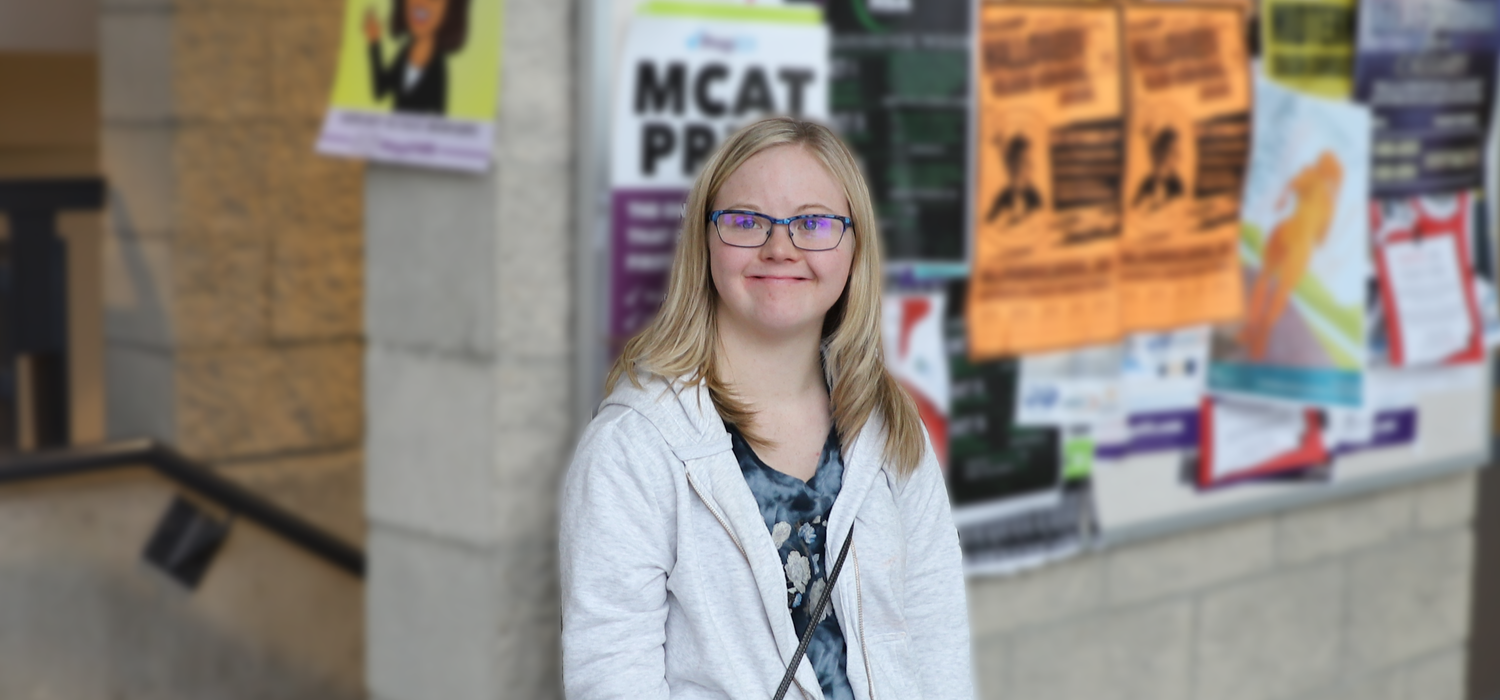
Darius Leung studies history, Greek and Roman studies and music with IPSE.
Kailey Lewis, Student and Enrolment Services
Oct. 29, 2018

Without further ado… Shelley Moore!”
With those words, University of Calgary student Hannah Copithorne introduced the guest speaker to an audience of educators, facilitators, students, employees and visitors.
The group burst into applause.
Copithorne is no stranger to public speaking, although her audience is usually the three- and four-year-old children she reads to at her part-time daycare position. “They like it when I read to them, sometimes they pick up books off the shelves and have me read them,” she says. “I read with lots of expression.”
She is enrolled in classes at UCalgary with the Inclusive Post-Secondary Education (IPSE) program. IPSE grew from a grassroots movement of parents of diverse learners advocating for space in educational institutions, to campus services supporting the education and employment of 16 students and 13 graduates at UCalgary and St. Mary’s University (STMU).
IPSE facilitates an authentic university experience for students with intellectual disabilities.
The future of inclusion in education
The presentation, the Future of Inclusion with Shelley Moore, was a two-hour investigation into how inclusive education is thought about and implemented. The event was co-hosted by the Integrated Post-Secondary Education Society of Alberta, UCalgary and Mount Royal University.
Moore, a PhD candidate in the Faculty of Education at the University of British Columbia, is a best-selling author, award-winning research storyteller, TEDx speaker, advocate of inclusion, and globally in-demand consultant on inclusive education.
Sharing from her experience as a teacher, Moore challenged the audience to re-imagine inclusive education — to rethink how learners are expected to demonstrate knowledge and consider new ways of removing barriers.
“I like how she talks about people with disabilities and meeting new people outside of the Down Syndrome community,” Copithorne says of Moore’s focus on inclusive learning communities.
Darius Leung, another IPSE student, studies history, Greek and Roman studies and music. He was also happy to take some time out from his course work to hear Moore speak.
“I like motivational speakers,” he says. Leung was one of two students who attended the State of the Art Conference in Syracuse, New York last year, a gathering of student self-advocates and community leaders from around the globe.
“Shelley Moore’s storytelling as a wonderful blend of a personal journey and academic thought that was truly inspirational and enjoyable,” says Dr. Susan Barker, vice-provost, student experience. “Her presentation helped us challenge our own thinking of inclusive learning environments and why inclusion matters to everyone.”

Darius Leung studies history, Greek and Roman studies and music with IPSE.
Kailey Lewis, Student and Enrolment Services
Presuming competence in higher education
Moore’s work emphasizes the importance of presuming competence in higher education.
“For a long time, learning has really only been valued from one perspective — one needs to read and write,” Moore explained. “Presuming competence would open up the world of higher education for many individuals who are very intelligent, but show their learning in different ways.
“I think a perfect example of this are Indigenous folks learning in Canada, who have long valued the spoken word as an expression and sharing of knowledge. In many places around the world, including Canada, this lens for learning is not equally valued in educational settings.”
Inclusive education at UCalgary
Thanks to the advocacy of parents, educators and the community, education is gradually becoming more accessible for people with disabilities. So far, there are five inclusive education programs at Calgary post-secondary institutions.
Barker is a strong advocate of the program and the students who participate. She believes inclusive environments need work and attention, but that we are all better for it.
“Sadly, we don’t always get it right, but we address the issues and learn from our mistakes,” she says. “For example, a recent graduate of IPSE was very disappointed that, on convocation day, she did not have a hood as part of her academic regalia like the students graduating from faculty programs. This made her feel different and excluded. Thankfully, she shared that experience, and we were able to act swiftly so that all IPSE graduates now have a red hood as part of their convocation experience.”
Rhonda Frizzell, director of IPSE services at UCalgary and STMU, notes that inclusive higher learning, and inclusion in general, is a way we all win.
“Our audience at the event showcased a wonderful cross-section of individuals who both affect and are directly impacted by inclusion,” Frizzell says. “I think Shelley’s presentation demonstrated the passion we all feel for IPSE and universal design as a road for equitable access to education. It’s transformative.”
Future of Universal Design
Universal Design for Learning (UDL) is one tool to overcome barriers in the classroom. It’s a way to create curriculum and classrooms providing students different ways to engage in learning, making the content accessible to diverse learning styles and abilities.
Shelley Moore believes universal design is beneficial for all learners, not only those who need supports or accommodations.
“[Universal design’s] fundamental goal is to provide access and to reduce barriers to learning,” Moore said. “I think sometimes in education, we do the opposite and see learning as a series of hoops and traps that are set until we weed out those who cannot manage.
“Both public and higher educational settings are realizing that we are missing out on incredible individuals. In other areas of society, especially in architecture and technology, universal design is an essential design framework, and would not be overlooked by any means, because it would be so inefficient and not cost-effective at all.”
IPSE facilitators hope to increase collaboration with campus partners to provide students with intellectual disabilities more opportunities to interact with professors, participate in the classroom and explore career options. Want to get involved? Contact Rhonda Frizzell if you have ideas about how your department, unit or faculty can support IPSE learners.